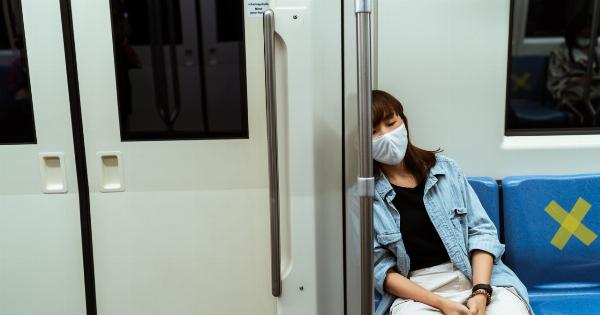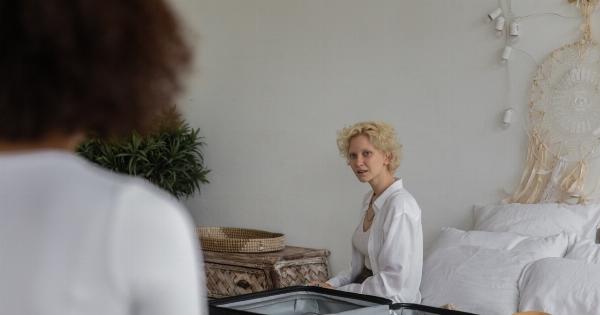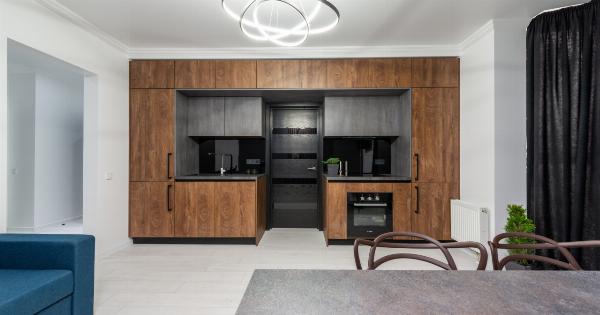Sleep plays a crucial role in our overall health and well-being. Most people take several precautions to ensure a good night’s sleep, such as investing in a comfortable mattress and maintaining a calming sleep environment.
However, one aspect that often goes unnoticed is the impact of sleeping with the bedroom door closed.
In recent years, there has been a growing concern about the potential dangers associated with sleeping with the bedroom door closed.
While it may seem harmless and even comforting to shut the door for privacy or to block out noise, there are hidden risks that everyone should be aware of. Let’s explore some of these hidden dangers:.
1. Increased Fire Hazard
One of the most significant hidden dangers of sleeping with the bedroom door closed is the increased fire hazard it poses.
In the event of a fire, a closed bedroom door can potentially trap smoke and heat inside the room, cutting off your escape route and reducing the amount of time you have to safely exit the house.
Fire safety experts recommend keeping bedroom doors open while sleeping to allow for better airflow, which can help detect and mitigate the spread of fire.
By keeping the door closed, you risk limiting your chances of survival in case of a fire emergency.
2. Limited Oxygen Supply
Another hidden danger of sleeping with the bedroom door closed is the potential for limited oxygen supply. As we sleep, our bodies require a continuous inflow of fresh oxygen to support vital functions.
Closing the door can impede the flow of fresh air, especially in rooms without proper ventilation.
Proper airflow is essential for maintaining healthy oxygen levels during sleep. Oxygen deprivation can lead to a range of health issues, including fatigue, headaches, and difficulty concentrating.
It is advisable to keep the bedroom door open to promote better air circulation and ensure an uninterrupted oxygen supply.
3. Increased Exposure to Harmful Substances
Keeping the bedroom door closed while sleeping can also increase your exposure to harmful substances.
Indoor air quality can significantly impact our health, and pollutants can accumulate in enclosed spaces, especially during the night when windows are typically closed.
By leaving the door open, you promote better air circulation, which helps reduce the concentration of harmful substances in the bedroom. This can be particularly crucial for individuals with respiratory conditions or allergies.
4. Delayed Emergency Response
In case of an emergency, every second matters. When you sleep with the bedroom door closed, it can potentially delay emergency response time.
If a family member or roommate needs to reach you quickly, an open door allows for easier access, giving them valuable time to respond to your needs.
By contrast, a closed door can serve as a physical barrier, obstructing the path of emergency responders and making it more difficult for them to reach you promptly.
To enhance emergency response time, it is advisable to sleep with the bedroom door open.
5. Difficulty Escaping Carbon Monoxide Poisoning
Carbon monoxide (CO) is an odorless and tasteless gas that can be produced by faulty appliances, such as gas stoves, fireplaces, or furnaces. If these appliances malfunction during sleep, CO can accumulate in your bedroom, posing a severe health risk.
By sleeping with the bedroom door closed, you limit your chances of detecting carbon monoxide leakage early. CO poisoning can lead to symptoms such as dizziness, nausea, and even death in severe cases.
It is crucial to have a functioning carbon monoxide detector and leave the bedroom door open to ensure early detection and escape.
6. Increased Risk in Homes with Pets
If you share your home with pets, sleeping with the bedroom door closed can present increased risks. Pets may inadvertently cause or contribute to emergencies, such as fires or accidents. Their ability to detect danger before humans can be invaluable.
By leaving the bedroom door open, you provide your pets with easier access to your room, allowing them to alert or wake you up in case of an emergency. Additionally, it enables better air circulation, which can benefit both you and your furry friends.
7. Psychological Impact
While sleeping with the bedroom door closed may seem comforting, it can have psychological consequences. Some individuals may experience feelings of anxiety or claustrophobia when confined in a closed space with limited visibility.
Sleep itself can sometimes be disturbed due to anxiety or discomfort caused by the closed-door environment. By sleeping with the door open, you can foster a sense of openness and promote better mental well-being during sleep.
8. Decreased Family Communication
For families, sleeping with the bedroom door closed can hinder communication. Having an open-door policy allows for easy interaction between family members, especially during the night when one may need assistance or reassurance.
If a child feels unwell or anxious during the night, having the bedroom door open makes it easier for them to seek support from their parents or guardians. It also fosters a stronger sense of connection and overall family well-being.
9. Enhanced Sense of Security
Some individuals prefer to sleep with the bedroom door closed because it provides a sense of security and privacy. However, it is essential to consider alternative measures to achieve these feelings without compromising safety.
Installing a security system or keeping a phone nearby can provide a sense of security without the risks associated with a closed door.
Additionally, proper outdoor lighting and lock systems can enhance overall home security, giving you peace of mind while sleeping with the door open.
10. Creating an Evacuation Plan
Regardless of whether you choose to sleep with the bedroom door open or closed, it is crucial to have a well-thought-out evacuation plan in case of emergencies.
Every household should establish clear exit routes and designate meeting points to ensure the safety of all family members.
Regularly practicing emergency drills, especially during nighttime, can help everyone familiarize themselves with the evacuation plan and respond effectively.
Remember to consider the specific needs and abilities of each household member to ensure a comprehensive and efficient plan.
In Summary
Although sleeping with the bedroom door closed may seem harmless, it is essential to be aware of the hidden dangers it can pose.
Increased fire hazards, limited oxygen supply, exposure to harmful substances, and delayed emergency response are just a few risks associated with keeping the door closed. However, everyone’s situation is unique, and personal preferences should be considered.
Ultimately, prioritizing safety while sleeping should be at the forefront of your decision-making process.
By understanding the potential risks and taking necessary precautions, such as installing smoke detectors and carbon monoxide alarms, maintaining good ventilation, and developing an evacuation plan, you can create a safe sleep environment that suits your individual needs.





























